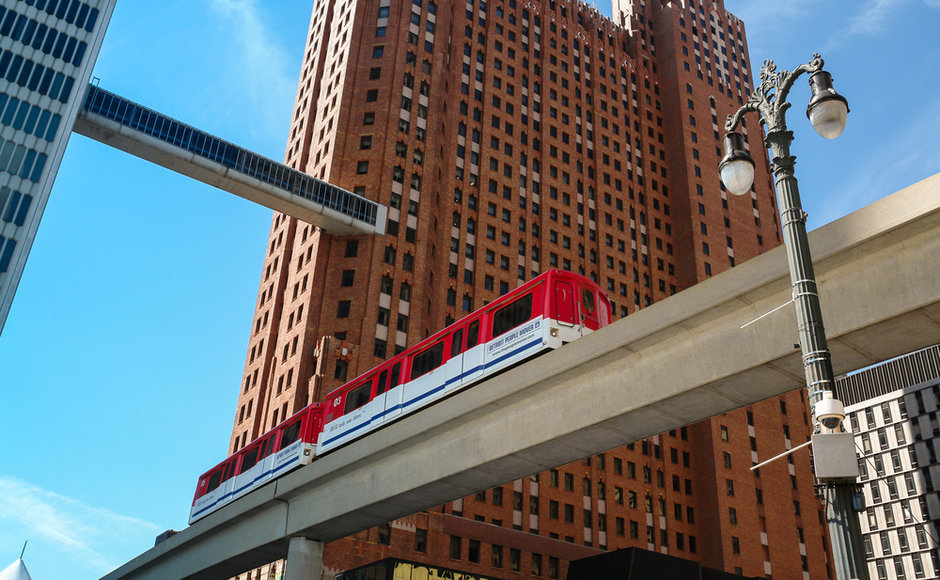Kudos to the online news site Michigan Capitol Confidential for exposing the high six-figure salaries paid to maintenance workers for the beleaguered Detroit People Mover.
In an online story published today, based on a Freedom of Information Act (FOIA) request, Capitol Confidential reports that the highest-paid People Mover employee in 2017 wasn’t the general manager or some other executive. It was a maintenance employee who had a base salary of $57,220 but ended up collecting $174,602 due to extraordinary amounts of overtime pay.
The unnamed employee was not an electrical engineer or anything similar but he had the job title of “electronic technician II” and he somehow earned more than $117,000 in overtime pay last year. While OT pay can pile up on weekends and holidays, overall this worker’s payroll records indicate that, beyond his standard 40 hours per week, he was paid nearly 2,800 hours of overtime last year. That’s 54 hours of additional weekly work, or more than 13 hours a day on a 24/7/365 basis.
I’m not buyin’ it.
Altogether, 11 People Mover employees received pay of more than $100,000 by the city in 2017. According to Capitol Confidential, the news site of the Mackinac Center for Public Policy, three of the monorail’s four maintenance shift supervisors collected six-figure pay despite base salaries of $61,131. One worker collected $105,456. Another was paid $135,395 and a third employee made $161,368.
Four people with the job title of “mechanical technician I” also were paid substantially more than their base salary of $46,404. One earned $111,182, another reached the $105,109 level, and the last two were paid $94,322 and $95,154 respectively.
Tom Gantert of Capitol Confidential reported these suspect salary figures after filing a FOIA request with the obscure Detroit government agency known as the Detroit Transportation Corporation (DTC), which oversees People Mover operations.
In a city with an unemployment rate of 9.5 percent, the DTC claims that its high salaries and overtime costs result from a worker shortage that leads to vacant positions — on jobs that pay about $50,000.
With the resurgence of downtown Detroit, the revival of the Midtown area, and the prominence of Comerica Park, Ford Field and Little Caesar’s Arena, I would suggest that the People Mover makes more sense now than ever. Rather than a loop around a deteriorating inner city, which was the case as recently as a decade ago, the ongoing renaissance of countless buildings and property sparked by Quicken Loans CEO Dan Gilbert has inadvertently transformed the People Mover’s purpose.
Instead of relying on old-school taxis or buses, workers and sports fans can move from one place to the next within the urban core by riding the inexpensive monorail system. Traveling from Cobo Center conventions and other big events, such as the auto show, or Lions/Tigers/Pistons games to nearby restaurants, entertainment venues or casinos makes the People Mover shuttle convenient. Motor City visitors can also avoid the ridiculously high prices for parking that exist around the stadiums and Cobo.
Yet, basic marketing techniques by city officials to promote the benefits of the 3-mile monorail loop are still missing, as many suburbanites still shun the People Mover.
As a result, the elevated monorail remains an inexplicably burdensome expense within the city’s budget, even while state and federal dollars help subsidize the transit service. Beyond the indefensible wages paid to employees, the overall cost per trip is $10.51 while the average indivual fare is 62 cents, according to a website that tracks transportation data.
Surely, Detroit Mayor Mike Duggan, who previously straightened out financial messes at the SMART suburban bus system and at the Detroit Medical Center, and has followed suit by imposing cost efficiencies on city services, could step in.
Duggan should grab the wheel and make the People Mover an effective service that compliments the Detroit resurgence. After all, the last thing Motown needs right now is a bankrupt train to nowhere.





I think you neglected to consider overtime pay rate, time and one half or double time for Sunday’s and holidays. That will inflate gross payrapidlt
six figures??? wow that’s a lot.